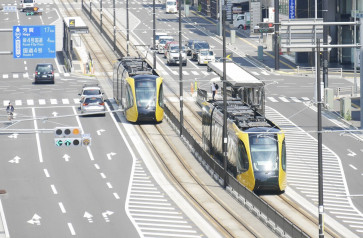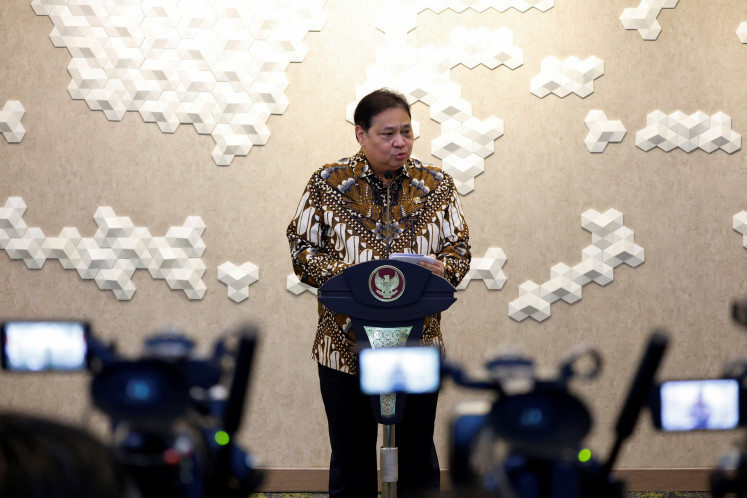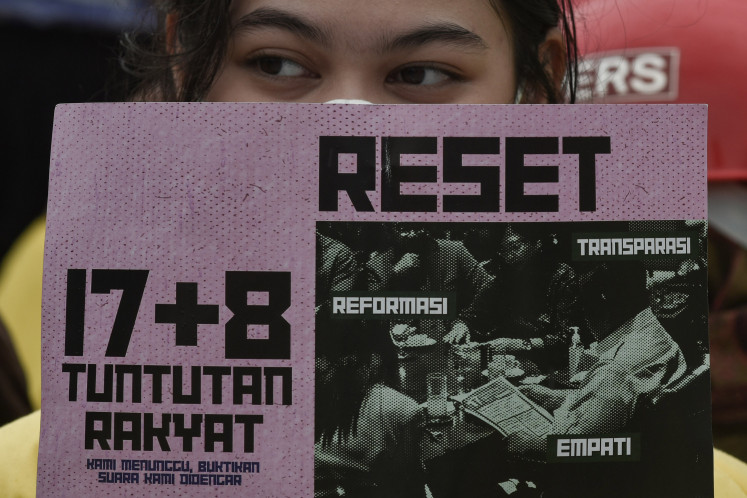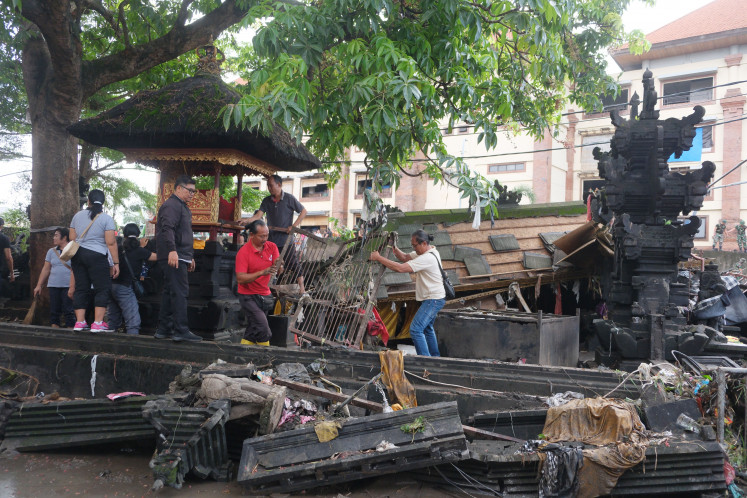Popular Reads
Top Results
Can't find what you're looking for?
View all search resultsPopular Reads
Top Results
Can't find what you're looking for?
View all search results‘Silent diplomacy’ needed in Asian conflict resolution
There were two of them: Former vice president Jusuf Kalla (right) talks to chair of the Asian Peace and Reconciliation Council Surakiart Sathirathai (center) and former prime minister of Malaysia Tun Abdullah Ahmad Badawi after an ambassadorial briefing at the ASEAN Secretariat in Jakarta on Wednesday
Change text size
Gift Premium Articles
to Anyone
T
span class="caption" style="width: 558px;">There were two of them: Former vice president Jusuf Kalla (right) talks to chair of the Asian Peace and Reconciliation Council Surakiart Sathirathai (center) and former prime minister of Malaysia Tun Abdullah Ahmad Badawi after an ambassadorial briefing at the ASEAN Secretariat in Jakarta on Wednesday. (JP/Jerry Adiguna)
Asian nations should pursue a more effective and subtle approach in resolving conflicts that could suddenly escalate into military confrontations and undermine the region’s economic prosperity, a peace institution has said.
Chair of the Asian Peace and Reconciliation Council (APRC), Surakiart Sathirathai, described Asia’s economic prosperity as being “threatened by political conflicts that can suddenly erupt into military confrontations”.
Asia has seen conflict “hot spots” that could flare up into open warfare if not carefully managed, from disputes in the South China Sea, the island row between China and Japan in the East China Sea, and the disputed Dokdo/Takeshima island between South Korea and Japan to the Cambodia-Thai border dispute surrounding the Preah Vihear Temple. Other ongoing conflicts in Asia include the persecution of the Rohingya minority in Myanmar.
Sathirathai said that subtlety was a more “efficient” way to resolve tensions, to help reduce the posturing that usually took place in cross-border or ethnic disputes. The continuing chest-beating by the Chinese and Japanese governments over the uninhabited islands in the East China Sea runs counter to the APRC’s belief in the “quiet” approach.
Talking at an ambassadorial briefing for the APRC on Wednesday, Sathirathai, who is also a former deputy prime minister of Thailand, spoke of Indonesia’s “success story in restoring peace”.
The council is using the end of the insurgency in Aceh as a model for settling disputes, as that conflict was resolved using third-party mediation and compromise on both sides.
APRC member and former foreign minister Hassan Wirajuda said the involvement of Finnish organization, the Crisis Management Initiative (CMI) in setting the Special Autonomy zone in Aceh in 2005 demonstrated the importance of impartial third parties in conflict talks.
“Silent diplomacy” is a core principal of the organization. The APRC will not publicize its ongoing mediation efforts and will announce their involvement only once a resolution is reached.
Two criteria need to be met for the council to become involved in conflict resolution: all the parties involved in the conflict must agree to have them there, and all the members of the council must approve the organization’s involvement.
Former deputy prime minister of Singapore, Shunmugam Jayakumar, recognized the limitations of this approach, but said an intrusive council would not succeed.
“Venturing into conflicts where we’re not invited would be futile. We are aware of the realities in which we have to operate, and that’s why we have to maintain modest objectives.”
Members understand, however, that their presence will not always go unnoticed in Asia. The council is made up of various former politicians and diplomats from the Asian region and the rest of the world. It includes former vice president Jusuf Kalla, as well as former Timor Leste president Jose Ramos Horta and former Pakistan prime minister Shaukat Aziz.
President Susilo Bambang Yudhoyono hosted members of the council at the Presidential Palace on Tuesday. They were “very encouraged” by his support, Sathirathai said.
According to former Malaysian prime minister Tun Abdullah Badawi, the treatment of religious minorities in Indonesia was discussed with Yudhoyono, who “made suggestions” to the council on the matter. Badawi also said he supported the president’s approach to dealing with religious tensions.
A similar organization was created by ASEAN last year, called the ASEAN Institute for Peace and Reconciliation. While both groups share the same goal, the APRC is strictly a non-governmental body.
The writer is an intern at The Jakarta Post










